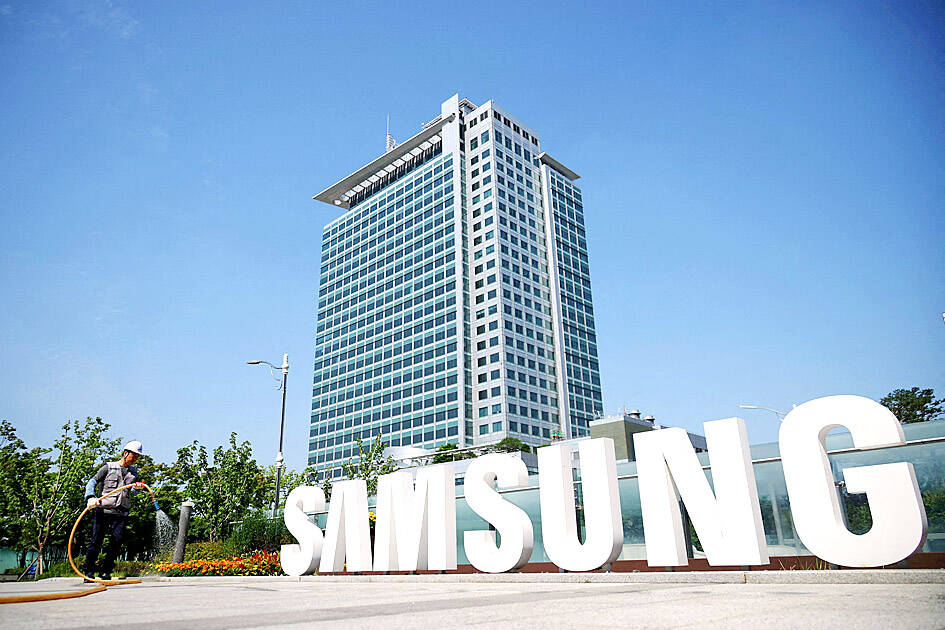Samsung Electronics Co posted its sixth straight quarter of declining operating profit, reflecting weak consumer demand and stoking uncertainty over the timing of a broader tech recovery.
South Korea’s largest company reported a 35 percent fall in operating income to 2.8 trillion won (US$2.1 billion), about 24 percent shy of estimates. Revenue slid more than anticipated to 67 trillion won. For all of last year, Samsung reported its slimmest operating profit in 15 years.
The results underscore how demand for smartphones and the memory chips that power modern electronics remains sluggish given economic uncertainty. It also muddies the outlook for a market recovery that many investors had hoped would emerge this year. Last month, rival Micron Technology Inc delivered a better-than-projected revenue forecast that suggested data center construction may make up for lukewarm computing and mobile device markets.

Photo: Reuters
“This shows that the rebound is slower than we all thought,” Counterpoint Technology Market Research director Tom Kang said. “Prices are not rising that fast and the demand from certain sectors is not that strong.”
Samsung’s consumer electronics unit also took a hit from fierce competition and higher marketing costs, while profit from its smartphone business likely came in toward the lower end of analysts’ estimates, CLSA Securities Korea Ltd analyst Sanjeev Rana said.
However, there are signs of recovery. South Korea’s semiconductor industry in November recorded the largest gains in years in both production and shipments. Given rising memory prices and improving demand, “it is likely that Samsung’s chip business will return to profitability within the first half of 2024,” Rana said.
Investors will want to hear about Samsung’s longer-term investment plans, particularly in the field of artificial intelligence (AI), when executives preside over the release of its full results on Jan. 31.
The company now aims to catch up with rival SK Hynix Inc in the burgeoning field of high-density memory chips, where it plans to increase capacity by 2.5 times this year. HBM, an advanced chip that handles data more quickly, works with hardware such as Nvidia Corp’s accelerators to speed up data processing for intensive tasks like training AI models.
Hynix chief executive officer Kwak Noh-jung told reporters he expected AI demand to help double the firm’s market value over three years.
“Samsung may have to gain market share in AI chips to achieve solid profit growth in 2024,” Bloomberg Intelligence analysts Masahiro Wakasugi and Phu Pham wrote in a note.
Samsung is also counting on a new lineup of devices and foldables to drive growth this year. The company is preparing to unveil its latest gadgets in the US later this month, at a time investors worry Apple Inc’s iPhone 15 might be running out of steam mere months after launch.

The US dollar was trading at NT$29.7 at 10am today on the Taipei Foreign Exchange, as the New Taiwan dollar gained NT$1.364 from the previous close last week. The NT dollar continued to rise today, after surging 3.07 percent on Friday. After opening at NT$30.91, the NT dollar gained more than NT$1 in just 15 minutes, briefly passing the NT$30 mark. Before the US Department of the Treasury's semi-annual currency report came out, expectations that the NT dollar would keep rising were already building. The NT dollar on Friday closed at NT$31.064, up by NT$0.953 — a 3.07 percent single-day gain. Today,

‘SHORT TERM’: The local currency would likely remain strong in the near term, driven by anticipated US trade pressure, capital inflows and expectations of a US Fed rate cut The US dollar is expected to fall below NT$30 in the near term, as traders anticipate increased pressure from Washington for Taiwan to allow the New Taiwan dollar to appreciate, Cathay United Bank (國泰世華銀行) chief economist Lin Chi-chao (林啟超) said. Following a sharp drop in the greenback against the NT dollar on Friday, Lin told the Central News Agency that the local currency is likely to remain strong in the short term, driven in part by market psychology surrounding anticipated US policy pressure. On Friday, the US dollar fell NT$0.953, or 3.07 percent, closing at NT$31.064 — its lowest level since Jan.

The New Taiwan dollar and Taiwanese stocks surged on signs that trade tensions between the world’s top two economies might start easing and as US tech earnings boosted the outlook of the nation’s semiconductor exports. The NT dollar strengthened as much as 3.8 percent versus the US dollar to 30.815, the biggest intraday gain since January 2011, closing at NT$31.064. The benchmark TAIEX jumped 2.73 percent to outperform the region’s equity gauges. Outlook for global trade improved after China said it is assessing possible trade talks with the US, providing a boost for the nation’s currency and shares. As the NT dollar

The Financial Supervisory Commission (FSC) yesterday met with some of the nation’s largest insurance companies as a skyrocketing New Taiwan dollar piles pressure on their hundreds of billions of dollars in US bond investments. The commission has asked some life insurance firms, among the biggest Asian holders of US debt, to discuss how the rapidly strengthening NT dollar has impacted their operations, people familiar with the matter said. The meeting took place as the NT dollar jumped as much as 5 percent yesterday, its biggest intraday gain in more than three decades. The local currency surged as exporters rushed to